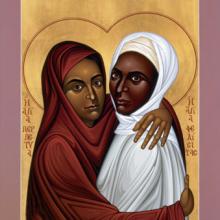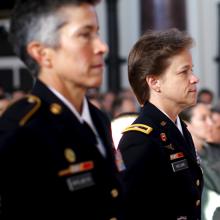Women
In so many of the gospel stories that are familiar to us, women were behind the scenes — always there, always present, always faithful — but nearly always in the background and hardly ever mentioned by the men in the stories, and certainly not the ones writing the stories. Their testimony as women was not even admissible in court under Jewish law; the word of a woman had no public credibility in that patriarchal culture. But God chose to reveal the miracle of Jesus' resurrection first to women. They were then told to report the astonishing news of the empty tomb to the men.
In the midst of so much death, how can we Christians celebrate Easter?
These questions can be paired with questions regarding our own sense of worship on that day. How much have we Christians replaced justice with worship, not taking one into serious relation with the other? Are we accustomed to worship in the total absence of justice?
My primary medium is portrait photography, and during my sessions I draw people out by asking questions about their very literal story. What is delightful for you in this season? What is hard? What I’ve found happen in these conversations is that decades of untended pain or suppressed pleasures begin to break forth, find air, and heal as needed or grow.
“It is a thinly-veiled reference to stereotypes about Islam and Muslims,” said Daniel Mach, director of the American Civil Liberties Union’s Program on Freedom of Religion and Belief. “This reference to honor killings is part of a broader effort to smear an entire faith by the extreme acts of a few and its inclusion in this order bolsters the argument that this is simply another attempt at a Muslim ban.”
Last week, organizers for the Women’s March on Washington encountered pushback on multiple sides for removal of pro-life sponsors, leading many to wonder if there was space in the movement for Christians or women who are opposed to abortion. But many who attended the march on Jan. 21 were driven there by their religious convictions — saying President Donald Trump’s positions “violate the gospel” by showing a lack of compassion for Muslims, people of color, and women.
If the High Court ultimately rules that women can read Torah in the women’s section of the Western Wall, ultra-Orthodox lawmakers in the Israeli Parliament may try to pass legislation to criminalize the practice, not only at the traditional wall but also at Robinson’s Arch.
Since coming to power in 2012, the government has made abortion completely free as part of the National Health Service, scrapped a requirement that a woman must be “in distress” to obtain permission to abort, and dropped a weeklong “reflection period” between applying for and carrying out an abortion. It decided to act again in part because several anti-abortion sites were found to be ranked higher on search engines than the government’s own abortion information site. Although their home pages appear to be neutral, the sites and their advice hotlines — run mostly by Catholic anti-abortion activists — are on closer inspection clearly against abortion and stress the physical and psychological damage they say the procedure can cause.
I fear now, as I have feared for months, the impact of his presidency on vulnerable people — including the white and working-class voters in places like my home state of Ohio who lent him their support.
Christians always have disagreements about policy proposals or party platforms during election seasons. But this year, I wonder how white Christians who read the same Scriptures and hold many of the same beliefs that I do could support a man who in word and deed has flaunted the core teachings of our faith.

Image via wavebreakmedia/Shutterstock.com
“I think it took a comment from Trump that personally affected a majority of evangelicals for there to be a tipping point,” said Katelyn Beaty, editor at large of Christianity Today, and author of A Woman’s Place: A Christian Vision for Your Calling in the Office, the Home, and the World.
“More than half of every church is women, and all those women are affected by comments about sexual assault.”
There is an unmistakable energy when women come together. In my experience, a boldness and brilliance fills the space in rich and surprising ways when women are gathered.
Such was the case as more than 1,500 women from across the country attended the recent We Won’t Wait summit in Washington, D.C., to organize and strategize for a better life for their families and communities. But this was no ordinary conference.

Sarah Reynolds / Southern Poverty Law
HUMAN TRAFFICKING is one of the least morally controversial social justice issues of our time. Agreement that human trafficking is wrong and must end is widespread, if not completely unanimous. Yet when most people hear the term “human trafficking,” they envision sex trafficking: vivid images of young women forced to work in “massage parlors” and brothels, selling sex on the streets of major cities.
But human trafficking is broader than sex trafficking. U.S. law defines human trafficking through the legal categories of fraud, force, or coercion. In simple terms, human trafficking occurs when individuals lose control over their lives and are forced to work for nothing or next to nothing. Someone who has been trafficked does not have control over the terms and conditions of their employment; they can’t leave for fear that they or someone they care about will be harmed as a result.
So while trafficking certainly can take the form of sexual exploitation, it can also look like nannies or janitors, workers in slaughterhouses or meat-packing plants, people forced to work on factory assembly lines and rural farms. It takes place in both the formal and informal economies; it may involve adults and children.
When sex trafficking isn’t
Human trafficking hasn’t always been so tightly linked to sex trafficking. In the 1980s and 1990s, there were a number of nonprofits dedicated to combatting labor exploitation in all its forms. But when one of the first pieces of anti-trafficking legislation was proposed in 1999, its congressional sponsors wished to differentiate between sex-trafficking and other forms of labor exploitation. They “did not want ‘low-wage sweatshop issues’ to cloud the issue of human trafficking, which, they argued, was essentially about the sexual exploitation of women and girls and not about exploited labor more generally,” as Letitia Campbell and I wrote in 2014. Significantly revised anti-trafficking legislation was signed into law in late 2000.
Beginning in 2001, the George W. Bush administration implemented the new anti-trafficking law, making prostitution and sex-trafficking centerpieces of its gender policy. A 2002 National Security Presidential Directive on human trafficking called prostitution “inherently harmful and dehumanizing,” and the administration insisted that prostitution and sex-trafficking are linked phenomena.
For 56 YEARS, Loretta Lynn has rarely paused from recording and touring. A career path that long is bound to have its ups and downs. But the past decade or so has definitely seen a Loretta Lynn renaissance.
It started back in 2004 with the album Van Lear Rose, a collection steeped in the rootsy alt-rock aesthetic of Jack White, who produced, played guitar, and even sang a duet with Lynn. Next came the 2010 tribute album Coal Miner’s Daughter, on which White’s band, The White Stripes, was joined by artists ranging from Alan Jackson and Martina McBride to Nashville outsiders Lucinda Williams and Steve Earle to perform a sampling of Lynn’s greatest hits. This year has seen the debut of a PBS American Masters documentary about Lynn and another startlingly good new album, Full Circle.
Both the title and the choice of material on Full Circle sound for all the world like a lifetime victory lap for the 84-year-old singer-songwriter. Telling the story of her career, the collection starts with a re-recording of the first song she ever wrote (“Whispering Sea”) and ends with a Willie Nelson duet on “Lay Me Down,” a song that features the line, “I’ll be at peace when they lay me down.” In between, she revisits a couple more of her older songs, and, for the first time, records the kind of traditional old-time material she heard growing up in the east Kentucky mountain community of Butcher Holler.
When Loretta Lynn came to Nashville in 1960, she was without precedent—a female country singer who wrote her own songs. She didn’t follow the rules of the music business because she and her manager-husband didn’t know them. Instead, Lynn came to town as a do-it-yourself phenomenon, promoting her records out of the trunk of the family car.

Everett Collection / Shutterstock
WITH THE RECENT decision to open combat positions in the U.S. armed forces to women, Selective Service registration is back in the news, in the courts, and in Congress. While much of the debate has focused on issues of gender—will young women be required to register?—the problems with draft registration are extensive and worthy of more thorough consideration.
For many people of faith and people of conscience, questions around Selective Service registration are not new, and, ethically speaking, nothing is different now that women may be part of the equation. For many, the questions around Selective Service registration have long been ones of preparation for war, militarization of our communities, and coercion of individual conscience.
The Selective Service act of 1917 launched the modern American version of the government raising an army in a time of war. In 1975, following the Vietnam War, draft registration was suspended, but it was reinstated under President Carter in 1980 and continues today. There is no option to register as a conscientious objector, no matter one’s religious beliefs.
Over the last 35 years, millions of young men have violated the law by failing to register. Only 20 of them have been prosecuted for the felony offense—19 of those were resisting for reasons of faith or conscience.
The last indictment for failure to register was filed in 1986. The government thought it would prosecute a handful of resisters to set an example and encourage compliance. The strategy backfired. When these conscientious objectors were interviewed on the evening news, claiming allegiance to a higher moral law, noncompliance with registration actually increased, much to the government’s dismay. It had underestimated the power of conscience. It failed to take into account a universal truth: When we follow the counsel of our conscience, we tend to make better decisions.
"Can women really lead in the church?" We still hear this question in our churches, often coupled with silly, irrational, or demeaning thinking. Would we put up with the same excuses for excluding men from leadership?

Image via bruniewska/Shutterstock
There are women in my life I choose to breathe with. With these women, I turn our breath into sounds, sounds into words, and raise them together in solidarity across the currents of justice. Together, we fight for the environment, we fight for rights, for black lives, for women's rights — and constantly strive for peace.

Image via Igor Zh. / Shutterstock.com
It all began for me as a young girl, spending many childhood summers with my aunt — my father’s eldest sister. Her name was Hilal, which means “crescent moon” in Arabic. No name could have been more appropriate for her — just as the spiritual lives of Muslims center on the crescent moons of the lunar calendar, my family’s spiritual center stood upon this strong minded, faithful, and dedicated matriarch.

Image via A.Currell/Flickr.com
When first married, my wife and I joined a PC(USA) church, partially out of our commitment to male-female equality. So at our new members’ class when we were asked, in a darker-timeline version of a mixer, to try and name the apostles from memory, the table my wife and I were at came up with twenty apostles (not quite what the leader had in mind). The Twelve, plus Matthias, Paul, Barnabas, Silas, Timothy, Apollos, Andronicus, and of course — not to leave out my wife’s favorite — Junia.
AFRAH ZOUHEIR FLEXES HER HAND as she purposefully stirs a pot of lemon juice, the fruity aroma filling the air as it rises to a boil.
“It needs to be hot in order to mix well with the sugars before it cools down and thickens,” she explains. “Then we bottle it and let it settle into a syrup.”
Zouheir has all of the looks of a professional chef. Her shoulder-length dark brown hair is tied back in a hairnet and her hands are coated in plastic gloves. She wears an apron over her sweatshirt, fanning the air, making sure that the lemon syrup drink she is making smells as it is supposed to; she appears undaunted about managing multiple pots simultaneously simmering over an open fire.
However, this is her first time working in a kitchen—at least professionally. In Mosul, Iraq, where she is from, she was a kindergarten teacher. But when the Islamic State invaded her home city in late 2013 and began targeting religious minorities, including Christians like Zouheir’s family, she grabbed her belongings and fled to Lebanon with her husband and four children. After a short stint in Beirut, the capital city, where rent is expensive and prejudice against refugees, among other factors, makes work hard to come by, she and her husband moved to Falougha, a mountain village where the air is fresh and, most important, the rent is cheap.

4Max / Shutterstock
A MILLION YEARS ago, when I was 23 years old, I sat in a lecture hall, flanked by college students who tutored at the youth program where I worked. They had invited me to their campus ministry’s worship service. An Asian-American woman named Susan Cho—young (about my age), tall, straight-backed, clear-voiced, and refreshingly funny—stepped to the podium and began preaching.
I sat transfixed. She dove into the scripture and it came alive! She explained what was going on in the world of the biblical characters in a way that made it feel as if they were living today. I felt like I knew them—I understood them. And then she brought home the meaning of the text for our lives in Los Angeles, months after the 1992 riots. This woman gave one of the most dynamic and biblically accurate sermons I had ever heard.
But then a familiar thought came into my head: “This is heresy,” it whispered.
You see, in college I was part of an evangelical ministry in which women could lead behind the scenes and share their testimony during worship services, but we could not preach or, for that matter, teach the scripture—especially to men. Ideas of male dominance were never taught outright, but they were observed like tenets of the faith.

Photo courtesy of REUTERS / Mike Segar
Key evangelical figures have come out staunchly against a proposal to register women for a possible military draft, arguing it would weaken America’s military readiness and is at odds with traditional male-female relationships.
“A nation relying on female combatants is a nation that has been brought to its knees by political correctness,” Andrew Walker of the Southern Baptist Convention’s Ethics and Religious Liberty Commission wrote on the group’s website.










